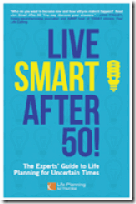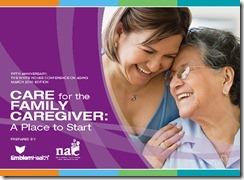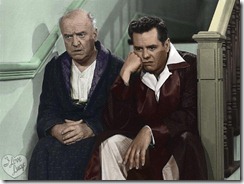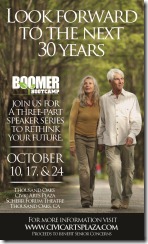 It was Stephen Covey who said, “ Begin with the end in mind.” That got me to thinking. What regrets do people express as they near the end of life, and what actions can we take now so we don’t have similar regrets? In her book, “The Top Five Regrets of the Dying,” palliative care nurse Bonnie Ware shared the most common regrets she heard from her patients. With 2013 approaching, the regrets Ware identifies offer food for thought to those of us in the second half of life as we take yet another fresh stab at setting down our New Year’s resolutions. Below are the top regrets and resolutions to remedy them. Regret No. 1: The most common regret of all dealt with not having the courage to live an authentic life and having many long-held dreams go unfulfilled. Resolution: Assess yourself. Living an authentic life isn’t about chasing every dream we may have. It involves building self-awareness—of our values, strengths and personal motivations. Arrange your work or personal time (or...
It was Stephen Covey who said, “ Begin with the end in mind.” That got me to thinking. What regrets do people express as they near the end of life, and what actions can we take now so we don’t have similar regrets? In her book, “The Top Five Regrets of the Dying,” palliative care nurse Bonnie Ware shared the most common regrets she heard from her patients. With 2013 approaching, the regrets Ware identifies offer food for thought to those of us in the second half of life as we take yet another fresh stab at setting down our New Year’s resolutions. Below are the top regrets and resolutions to remedy them. Regret No. 1: The most common regret of all dealt with not having the courage to live an authentic life and having many long-held dreams go unfulfilled. Resolution: Assess yourself. Living an authentic life isn’t about chasing every dream we may have. It involves building self-awareness—of our values, strengths and personal motivations. Arrange your work or personal time (or...
 Each year during Thanksgiving weekend I put together my holiday shopping list. And each year my list gets a little shorter as some friends and family say, “Let’s forget the gift giving; please donate to a good cause on my behalf.” Not a bad idea, giving to those that really need it and where your gift can truly make a difference. If you’ve opened your mail in the last few weeks, it’s easy to see there are mountains of charities needing our help. For some, deciding which charity to contribute to is not a decision at all. Many people choose a certain one because it’s close to their heart. For example, if your father battled Parkinson’s or your sister survived breast cancer, you are more likely to contribute to charities that helped your family during such difficult trials. Sometimes nature helps make our decision. Recently my mother in-law lost her house in Hurricane Sandy. Fortunately she was in an assisted living facility at the time, but her house—built by her husband 50 years...
Each year during Thanksgiving weekend I put together my holiday shopping list. And each year my list gets a little shorter as some friends and family say, “Let’s forget the gift giving; please donate to a good cause on my behalf.” Not a bad idea, giving to those that really need it and where your gift can truly make a difference. If you’ve opened your mail in the last few weeks, it’s easy to see there are mountains of charities needing our help. For some, deciding which charity to contribute to is not a decision at all. Many people choose a certain one because it’s close to their heart. For example, if your father battled Parkinson’s or your sister survived breast cancer, you are more likely to contribute to charities that helped your family during such difficult trials. Sometimes nature helps make our decision. Recently my mother in-law lost her house in Hurricane Sandy. Fortunately she was in an assisted living facility at the time, but her house—built by her husband 50 years...
 Visiting my parents in New Hampshire this week, I spent a lot of time in the grocery store. As a matter of fact, we shopped for groceries every single day. According to industry experts, seniors are the most frequent shoppers, averaging more shopping trips annually than any other cohort. Why? Possibly because seniors are less able to carry heavy bags and are more likely to be financially strapped, so shopping on an as-needed basis works for them. Over the next 10 years, U.S. households are predicted to grow 8 percent, according to market research firm A.C. Nielsen, but households closer to the poverty level are expected to grow twice as fast, at 17 percent. The majority of this growth is attributed to seniors living on limited budgets. Cash-strapped seniors have honed their shopping habits in recent years as the economy has worsened. More seniors rely on a shopping list, even though research shows they spend more time in the store and travel down every aisle more often than...
Visiting my parents in New Hampshire this week, I spent a lot of time in the grocery store. As a matter of fact, we shopped for groceries every single day. According to industry experts, seniors are the most frequent shoppers, averaging more shopping trips annually than any other cohort. Why? Possibly because seniors are less able to carry heavy bags and are more likely to be financially strapped, so shopping on an as-needed basis works for them. Over the next 10 years, U.S. households are predicted to grow 8 percent, according to market research firm A.C. Nielsen, but households closer to the poverty level are expected to grow twice as fast, at 17 percent. The majority of this growth is attributed to seniors living on limited budgets. Cash-strapped seniors have honed their shopping habits in recent years as the economy has worsened. More seniors rely on a shopping list, even though research shows they spend more time in the store and travel down every aisle more often than...
 At age 35 I found out my bones weren’t as strong and healthy as a normal 35-year-old’s. Back then, almost 20 years ago, on my first appointment with a new doctor, one of the forms I was asked to complete was a checklist of 13 risk factors for osteoporosis. I read down the checklist. Am I female? Check. Am I white or of Asian descent? Check. Am I small boned? Check. Do I have a less than average consumption of foods with calcium? I am not a big consumer of dairy products, so: check. Was there a history of osteoporosis in my family? Check. Did I have a history of long-term use of corticosteroids? Check. Did I like my wine? Check. Seven of 13, and I was just getting started. The doctor ordered a test to measure my bone density, which was quick and painless. A few days later she called and told me that I had osteopenia, a precursor to osteoporosis, in my hip bone and spine. I had thought osteoporosis was an old lady disease. I guess I was wrong, because at age 35 I certainly...
At age 35 I found out my bones weren’t as strong and healthy as a normal 35-year-old’s. Back then, almost 20 years ago, on my first appointment with a new doctor, one of the forms I was asked to complete was a checklist of 13 risk factors for osteoporosis. I read down the checklist. Am I female? Check. Am I white or of Asian descent? Check. Am I small boned? Check. Do I have a less than average consumption of foods with calcium? I am not a big consumer of dairy products, so: check. Was there a history of osteoporosis in my family? Check. Did I have a history of long-term use of corticosteroids? Check. Did I like my wine? Check. Seven of 13, and I was just getting started. The doctor ordered a test to measure my bone density, which was quick and painless. A few days later she called and told me that I had osteopenia, a precursor to osteoporosis, in my hip bone and spine. I had thought osteoporosis was an old lady disease. I guess I was wrong, because at age 35 I certainly...
 If you’ve ever been the caregiver for an impaired elderly loved one, you know where your focus lies almost every minute of every day—with the person you are caring for. My mom is the full-time caregiver for my dad, who’s had Parkinson’s for the past 12 years. Parkinson’s is a slow-growing disease that causes uncontrolled shaking, an inability to move and, at the later stages, dementia. My dad is 170 pounds; my mom weighs 95 pounds. My dad needs to be lifted out of bed, needs help to stand up and requires assistance for the few brief steps he takes with his walker to the bathroom, kitchen or living room. He needs to be bathed and shaved, and needs help with brushing his teeth. It’s a struggle to dress Dad, as he doesn’t have control of his muscles to help Mom put on his Depends, pants, shirt, socks and sneakers. Exercise can help Dad sustain what limited range of motion he has, so Mom cues him through his daily exercise routine. She also sings songs with him and has him recite...
If you’ve ever been the caregiver for an impaired elderly loved one, you know where your focus lies almost every minute of every day—with the person you are caring for. My mom is the full-time caregiver for my dad, who’s had Parkinson’s for the past 12 years. Parkinson’s is a slow-growing disease that causes uncontrolled shaking, an inability to move and, at the later stages, dementia. My dad is 170 pounds; my mom weighs 95 pounds. My dad needs to be lifted out of bed, needs help to stand up and requires assistance for the few brief steps he takes with his walker to the bathroom, kitchen or living room. He needs to be bathed and shaved, and needs help with brushing his teeth. It’s a struggle to dress Dad, as he doesn’t have control of his muscles to help Mom put on his Depends, pants, shirt, socks and sneakers. Exercise can help Dad sustain what limited range of motion he has, so Mom cues him through his daily exercise routine. She also sings songs with him and has him recite...
 Have you met anyone who’s had shingles? If so, they probably have a lot to tell you about their experience. My mother-in-law, who is a lung cancer survivor, says the pain associated with healing from her lung cancer surgery was nothing in comparison to the pain she experienced from the shingles outbreak she suffered 10 years ago at age 73. My mother-in-law had not heard of the shingles vaccine, even though the Centers for Disease Control and Prevention (CDC) recommends that adults age 60 and older get the vaccine, which helps reduce the risk of getting shingles by about half and reduces the severity and duration of the outbreak by more than 65 percent. The shingles vaccine works by protecting the body from a reactivation of the chickenpox virus that most people (98 percent) are exposed to during childhood. I’ve not had the shingles vaccine, as my doctor told me it was only indicated for folks 60 and older. I am in my early 50s. About six months ago I woke up with a severe rash...
Have you met anyone who’s had shingles? If so, they probably have a lot to tell you about their experience. My mother-in-law, who is a lung cancer survivor, says the pain associated with healing from her lung cancer surgery was nothing in comparison to the pain she experienced from the shingles outbreak she suffered 10 years ago at age 73. My mother-in-law had not heard of the shingles vaccine, even though the Centers for Disease Control and Prevention (CDC) recommends that adults age 60 and older get the vaccine, which helps reduce the risk of getting shingles by about half and reduces the severity and duration of the outbreak by more than 65 percent. The shingles vaccine works by protecting the body from a reactivation of the chickenpox virus that most people (98 percent) are exposed to during childhood. I’ve not had the shingles vaccine, as my doctor told me it was only indicated for folks 60 and older. I am in my early 50s. About six months ago I woke up with a severe rash...
 Last week I was watching a rerun of “I Love Lucy” and got to thinking: What if we fast-forwarded Ricky and Fred into today’s marketplace to see how their career choices would have turned out? And what if we did the same exercise with our chosen professions? Will our choices stand the test of time? And should they? You may remember that Ricky was a Cuban singer and band leader in a New York City nightclub. Fast-forward Ricky’s profession to this day and age, and there’s a good possibility Ricky would be out of work, what with the rise of rock ’n’ roll and the demise of live big band shows in NYC. At the very least, Ricky would need to reinvent himself. Now Fred, he’s a different story. Both he and Ethel were former vaudevillians. Fred lived through the Great Depression and was known for his penny-pinching nature. After vaudeville, Fred used his savings to purchase an NYC apartment building. Fast-forward Fred’s profession— owner of an apartment building on the Upper East Side of...
Last week I was watching a rerun of “I Love Lucy” and got to thinking: What if we fast-forwarded Ricky and Fred into today’s marketplace to see how their career choices would have turned out? And what if we did the same exercise with our chosen professions? Will our choices stand the test of time? And should they? You may remember that Ricky was a Cuban singer and band leader in a New York City nightclub. Fast-forward Ricky’s profession to this day and age, and there’s a good possibility Ricky would be out of work, what with the rise of rock ’n’ roll and the demise of live big band shows in NYC. At the very least, Ricky would need to reinvent himself. Now Fred, he’s a different story. Both he and Ethel were former vaudevillians. Fred lived through the Great Depression and was known for his penny-pinching nature. After vaudeville, Fred used his savings to purchase an NYC apartment building. Fast-forward Fred’s profession— owner of an apartment building on the Upper East Side of...
 It should come as no surprise that the rate of change in our world is accelerating. Or maybe it is a surprise? These days, change occurs so continually and rapidly that we may not realize the impact of this change until we reflect upon it and bring it into closer view. Economists, scientists and futurists have predicted that 78 million baby boomers becoming seniors will have a tremendous effect on society. Aging boomers are already putting a strain on our healthcare systems. The increase in the divorce rate has made life more complex. This rise in blended families (mother, fathers, stepfathers and stepmothers, in-laws and step-in-laws) will make the choice of how we care for our elders much more challenging. The idea of work has been changing. The career you once held may no longer be available or you may simply want to do something different for reasons of your own. Social norms are changing. Retirement may not be a relaxed, worry-free lifestyle. Today it may mean working...
It should come as no surprise that the rate of change in our world is accelerating. Or maybe it is a surprise? These days, change occurs so continually and rapidly that we may not realize the impact of this change until we reflect upon it and bring it into closer view. Economists, scientists and futurists have predicted that 78 million baby boomers becoming seniors will have a tremendous effect on society. Aging boomers are already putting a strain on our healthcare systems. The increase in the divorce rate has made life more complex. This rise in blended families (mother, fathers, stepfathers and stepmothers, in-laws and step-in-laws) will make the choice of how we care for our elders much more challenging. The idea of work has been changing. The career you once held may no longer be available or you may simply want to do something different for reasons of your own. Social norms are changing. Retirement may not be a relaxed, worry-free lifestyle. Today it may mean working...
 Today’s news stories speak volumes. Seniors struggle to make ends meet . . . more elderly find they can’t afford not to work . . . baby boomers are forced to support parents. A growing number of seniors are struggling financially. Forced to choose between meals and medications, homeowners insurance and healthcare, or cable and paid care—in Ventura County alone, a whopping 39 percent of seniors don’t have enough retirement income to adequately meet their basic needs, according to the Elder Index. I think most of us know that the difference between the poverty level and the true cost of basic needs in California is dramatic. Federal poverty guidelines for a single senior renter in Ventura County is approximately $12,000 in gross annual income, and for a senior couple with a mortgage, that level is under $16,000. But according to the Elder Index, established in 2010 by the UCLA Center for Community Economic Development, the real cost of living for a single senior renter is $24,000...
Today’s news stories speak volumes. Seniors struggle to make ends meet . . . more elderly find they can’t afford not to work . . . baby boomers are forced to support parents. A growing number of seniors are struggling financially. Forced to choose between meals and medications, homeowners insurance and healthcare, or cable and paid care—in Ventura County alone, a whopping 39 percent of seniors don’t have enough retirement income to adequately meet their basic needs, according to the Elder Index. I think most of us know that the difference between the poverty level and the true cost of basic needs in California is dramatic. Federal poverty guidelines for a single senior renter in Ventura County is approximately $12,000 in gross annual income, and for a senior couple with a mortgage, that level is under $16,000. But according to the Elder Index, established in 2010 by the UCLA Center for Community Economic Development, the real cost of living for a single senior renter is $24,000...
 Jessica and her husband are worried about their elderly neighbors, Bill and Rachel. Living alone and in their 80s, Bill and Rachel have been staples in the neighborhood for years. Rachel, who is a beautiful woman and prides herself on her appearance, has appeared outside her house each day wearing the same stained dress. When talking to neighbors, Rachel looks at them with fear in her eyes and says that she can no longer think straight. Bill, who is in great physical shape, received a warning from his golf buddy: “No more driving or I take away your keys.” Bill has been running red lights and getting lost on his way home. Bill and Rachel’s son Ted lives in the Midwest and just came home for a visit. A few of the neighbors expressed their concerns to Ted, and after observing burned pots and unpaid bills Ted extended his trip. He is scheduling doctor appointments and looking for resources to help. Bill, Rachel and their son Ted are part of the two fastest growing groups in...
Jessica and her husband are worried about their elderly neighbors, Bill and Rachel. Living alone and in their 80s, Bill and Rachel have been staples in the neighborhood for years. Rachel, who is a beautiful woman and prides herself on her appearance, has appeared outside her house each day wearing the same stained dress. When talking to neighbors, Rachel looks at them with fear in her eyes and says that she can no longer think straight. Bill, who is in great physical shape, received a warning from his golf buddy: “No more driving or I take away your keys.” Bill has been running red lights and getting lost on his way home. Bill and Rachel’s son Ted lives in the Midwest and just came home for a visit. A few of the neighbors expressed their concerns to Ted, and after observing burned pots and unpaid bills Ted extended his trip. He is scheduling doctor appointments and looking for resources to help. Bill, Rachel and their son Ted are part of the two fastest growing groups in...